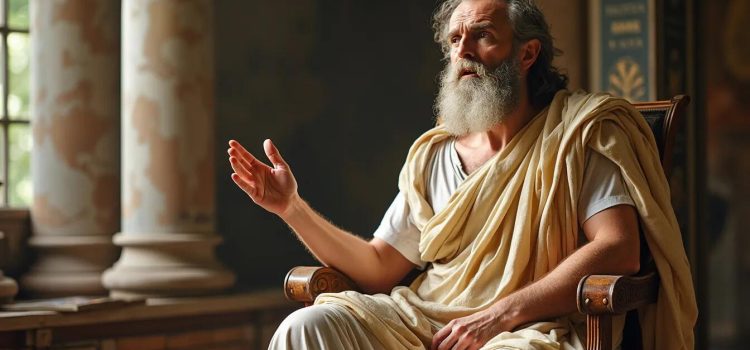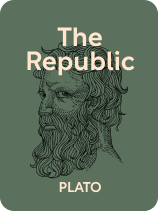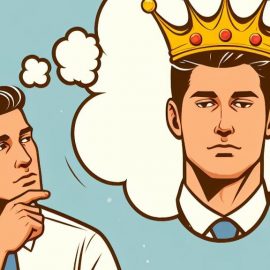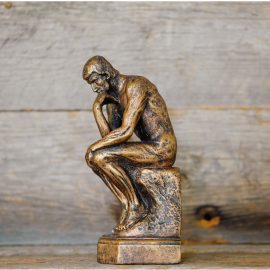

This article is an excerpt from the Shortform book guide to "The Republic" by Plato. Shortform has the world's best summaries and analyses of books you should be reading.
Like this article? Sign up for a free trial here.
How does Plato’s Republic end? How does Socrates respond to the challenge outlined in the beginning?
In The Republic, Book 10, Socrates argues that the just person, embodied by the philosopher-king, leads the most fulfilling life. He also presents a mythical tale about the afterlife, where souls are judged based on their earthly deeds.
Read on for an exploration of justice, pleasure, and the afterlife as we unpack Plato’s timeless wisdom.
Overview of The Republic, Book 10
After outlining the nature of just and unjust societies and how they correspond to individuals, in The Republic, Book 10, Socrates returns to the original challenge: proving that a just person lives a better life than an unjust person. To answer this challenge, he shows how the philosopher-king—the representative of the perfectly just city—is better off in life and death compared to the representatives of the inferior cities.
(Shortform note: While Plato answers The Republic’s major question, this isn’t always the case in his work. Only some of Plato’s dialogues—specifically ones written during his “middle period,” which includes dialogues like The Republic and Symposium—provide accounts of Plato’s specific beliefs. The others end on an ambiguous note with the characters failing to find any answers. Scholars suggest that during his middle period, Plato began to develop philosophical theories independent of Socrates’s more ambiguous style. This may explain his shift in style.)
The Preferable Life
Socrates argues that the philosopher-king lives the best life of the individuals he has described. Because the philosopher-king has the most knowledge and best understanding of the world, he knows which pleasures in life are greatest and which are fleeting or lead to future pain. He prioritizes the pleasure found in pursuing and obtaining knowledge, which is the most real and permanent kind of pleasure—after all, it involves the true and unchanging forms. But he also allows himself to enjoy physical pleasures or the pleasure of being honored when appropriate.
The other individuals Socrates describes have less knowledge and therefore are worse at choosing which pleasures to pursue. This means they’re more likely to choose fleeting pleasures or pleasures that lead to pain. They also neglect the pleasure of obtaining knowledge in favor of other, less real pleasures. The further a man is from the philosopher-king, the worse pleasures he pursues and the worse his life will be. For example, the tyrannical man pursues the most fleeting pleasures—food, drink, and sex—even as it leads to pain in the form of violence, drunken madness, death, and so on. He therefore leads the worst life.
(Shortform note: Later ancient Greek philosophers expanded on the idea that pleasure is the measurement of a good life, elevating the pursuit of pleasure above all else. For example, Greek philosopher Epicurus (341-270 BCE) argued that pleasure was the primary good in life. He believed that people should try and minimize distress and negativity in their life in favor of pursuing pleasures. Similar to Plato’s argument, this meant picking and choosing pleasures that wouldn’t lead to further pains—as a result, Epicurus ultimately supported a lifestyle of moderation.)
The Preferable Afterlife
Socrates concludes by asserting that, irrespective of one’s fortune or misfortune in life, justice is meted out in the afterlife. He elucidates this concept through a mythical tale about a warrior named Er.
As Socrates recounts, Er was a soldier who was killed in war and came back to life 12 days later. Upon his return, Er described how, during his death, his soul and countless others were evaluated for their earthly deeds. The just were commended for their life’s actions, while the unjust faced retribution. Each soul then selected a new body—human or animal—to inhabit in their next life.
Prudent, virtuous souls chose good lives. Some of the unjust learned from their past and opted for better lives than they had lived previously. Others, refusing to acknowledge their wrongdoing, chose lives just as deplorable as they knew before. As they journeyed back to earth, they drank the water of forgetfulness, erasing all memory of what had just happened—with the exception of Er. He was instructed to return to his original body and share his experience to inspire others to lead more exemplary lives.

———End of Preview———
Like what you just read? Read the rest of the world's best book summary and analysis of Plato's "The Republic" at Shortform.
Here's what you'll find in our full The Republic summary:
- Plato’s concept of justice
- Why living a moral life is good for its own sake
- How later philosophers interpreted and responded to the ideas in The Republic






